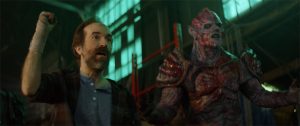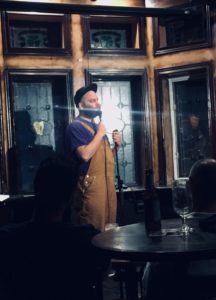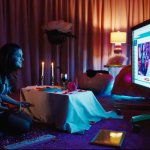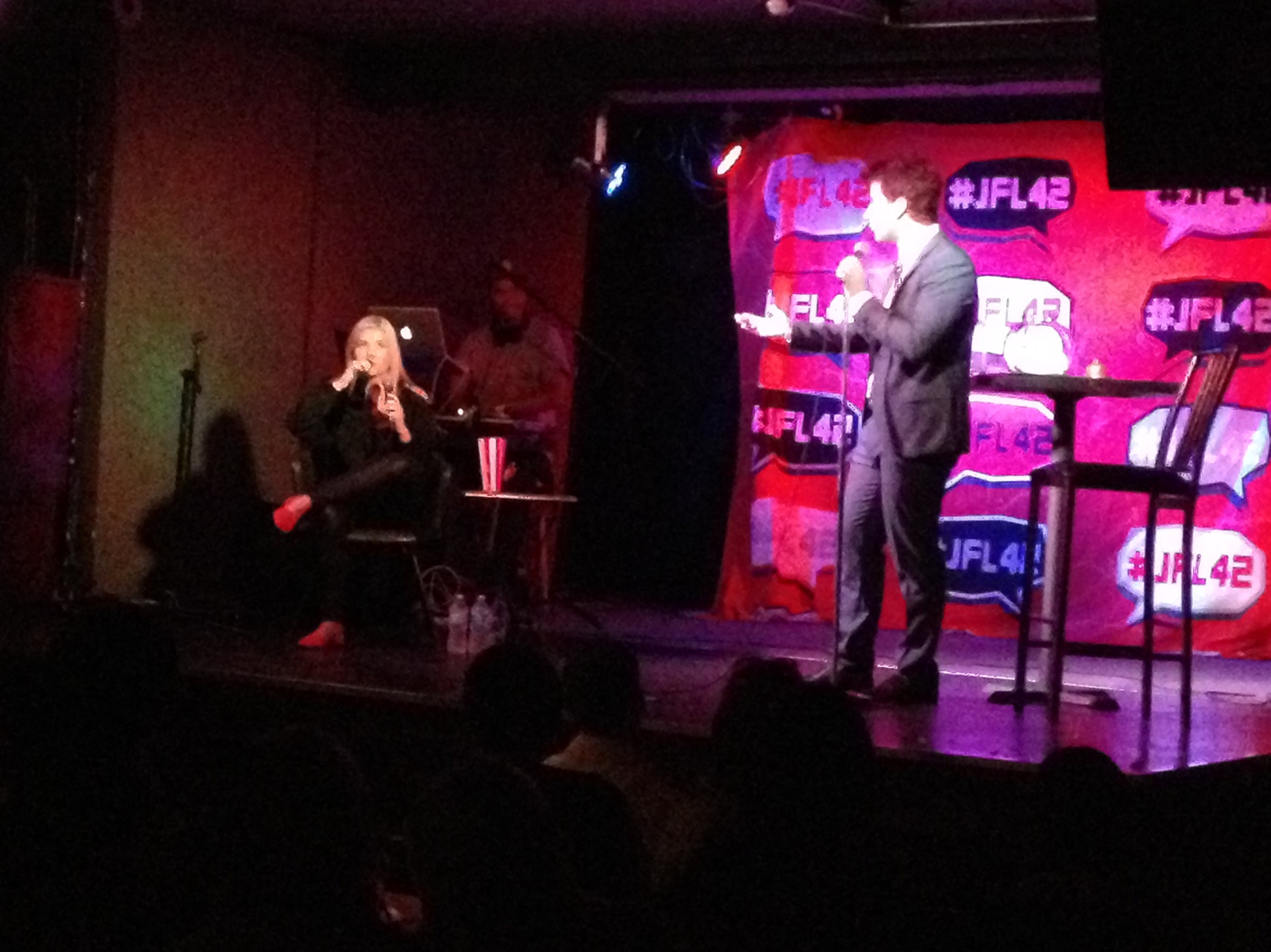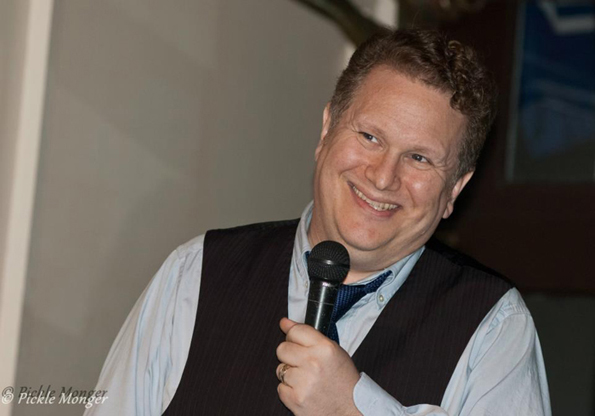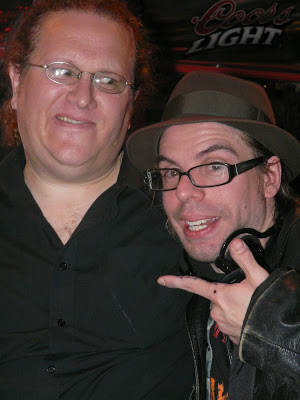Briana Templeton and Gwynne Phillips Chat About ‘None of Our Business’
Comedians Briana Templeton and Gwynne Phillips have unveiled their new Audible Canada original series, the hilarious None of Our Business. Each episode features the duo interviewing a celebrity guest about the funniest, freakiest conversations they’ve ever overheard, followed by a comedic sketch based on those stories. All ten installments are now available, featuring talks with Colin Mochrie, Reggie Watts, Anna Sale, and Col. Chris Hadfield.

Voted “Best Duo” at the LA Comedy Festival, Templeton and Phillips have been working together for years as the Templeton Philharmonic, performing live at comedy fests all over North America, as well as writing and acting in their own short films, including the absurd and sinister Dinette.
Earlier this week, we were fortunate enough to chat with the duo about None of Our Business, how they make each other laugh, and their early days in comedy.
How did this project come together?
B: Well we’ve been doing sketch comedy together a long time, and we got in touch with Audible about pitching some different ideas for an audio series, specifically Canadian comedy-oriented stuff. A lot of our sketches, even though we tend to do them live, are influenced by eavesdropping — stories that we hear on the subway or a restaurant or a cafe — and Gwynne had the brilliant idea of making a whole show based on it.
G: And then I thought None of Our Business was just a silly name, and we pitched it to them and they loved it!
Why was Audible the right fit?
G: We performed at the San Francisco Sketchfest, which is an amazing festival and I highly recommend it to any comedian, and they were one of the main sponsors there. They had like a hub at the hotel, so we kinda got to know them a bit. From there, we just made a couple of connections and they were looking for pitches for Canadian content, so we sent them five ideas, and they liked this one best.
B: The San Francisco Sketchfest was really great because we ended up going back there for one of our episodes, actually– with Tony Hale. It was really fun.
What were some of those other ideas you pitched to Audible? What was the runner-up?
G: We had a, [laughs] I don’t know if it was the runner-up, but we liked it. I think it was called Geraldine, and it was like a 1930s murder-mystery radio drama about a woman named Geraldine who goes missing, but you know, maybe that’ll be for another time!
I love that, and it’s kind of in line with your short film, Dinette!
G: Yeah exactly!
Which I loved so much and has one of the best lines I’ve ever heard: “They ate each other– to death.”
G: “To death!”
B: [laughs] Thanks so much.
You both have done live sketch work, short films, and now an audio series. You’re kinda stretching different muscles with each, so how do you sort of assign a medium to an idea?
B: That’s a good question! I think sometimes we have a concept and try to figure out what medium would work best, but sometimes the medium comes first. If we have a slot at the Fringe Festival, we’ve gotta do something that works live. We can go either way, but each medium has its own joys and frustrations. The thing we really loved about doing an audio series was that we could really set something anywhere and just go wild.
G: And there’s so much freedom, ‘cause you’re not really thinking about, “Oh no, we can’t afford that mechanical shark” or something. You can just do whatever you want, basically. And luckily we have Gavin Whelehan, who’s our sound designer who did a fantastic job. He can basically do anything, so if we need the sound of, like–
B: A thousand broken xylophones–
G: Then he’s like, “Done.”
I was listening to a bit of the Chris Hadfield one, and– by the way, Reggie Watts and Tony Hale are in the same sort of category of actors and comics, and then you have a world-famous astronaut. How did that happen?
B: We did a show with him, believe it or not, back in 2014, I believe. He has this series called Generator, that Col. Hadfield and his team put together. The one we were in was at Massey Hall, which was really cool, and it’s essentially a show that brings together ideas about science and arts and experimental stuff. We were really honoured to be a part of that.
G: And we were in the same dressing room as him, so we got to chat with him for a bit and he has a great sense of humour. He’s just a really fun guy, and he’s quite relaxed. Like, he plays instruments and sings, and we just really got along with him and thought he’d be a great guest to have.
With a career like that, the stories he has must be incredible.
B: We had such a long list of questions we wanted to ask him, and it was hard to whittle it down to like a five minute interview. We had a Skype call with him while he was in Australia and it was like 7am or something horrible!
G: But he’s such a lovely man; he was like, “No problem.”
So with people like Scott Thompson and Colin Mochrie, you’ve got a fair bit of Canadian representation.
G: Yeah! Because it’s gonna be released on audible.ca and .com, we thought it would be nice to have a mix of both. In the States, some Canadian celebs are not quite as well known, so we kinda wanted people we thought everybody would know. And we’re really lucky to have personal connections to Colin Mochrie and Scott Thompson. They were really generous in giving us their time.
How many episodes are in the can and how long did it all take to produce?
B: We have ten episodes and they’re all up already!
G: Netflix style. You can binge listen. Is that a thing? I think people just binge everything– TV, audio, anything.
B: So because we delivered all ten episodes at the same time, I think it took us eight months altogether.
That’s like making a season of TV. It’s a pretty large undertaking.
G: Yeah! We knew it would be a large undertaking, but we had a very clear idea of how we wanted it to sound, and obviously we were building it from the ground up. We gave Gavin a lot of challenges, you know, and it does take a while for it to sound full and real.
Sure, and it’s far from an after-thought. It’s baked into the pre-production process, so it must take a lot of time to figure out.
G: Oh it absolutely is. But we’re actors and writers and comedians, so we get in the room, we’re like, “We’re just gonna do this. You could make it sound like that, right?” And he’s like “Yeah. See you in four weeks.” [laughs] “Ok great, bye!”
B: But theatre of the mind, though!
I’m always so jealous of people who have super malleable voices and can just nail different accents, like the kind of 40s accent you both did in Dinette. Is that something you guys just figured out you could do as kids and just rolled with it?
B: We’d always loved doing different accents when we were kids growing up, and we went to theatre school together, so we’ve done lots of crazy characters from Shakespearean theatre to German experimental theatre to years of sketch comedy together. Thanks for noticing that! Because we love doing a huge range of character voices.
G: I think it’s also– one of the ways we get into creating characters and writing sketches is just by voices. Sometimes we’ll just put a phone on the table, press record and start improvising in a weird voice and see where it goes.
B: And it’s how we make each other laugh, too. Like if we’re just hanging out then we’ll do weird character voices.
How did you guys know that you were kindred spirits, so to speak? The thing that made you realize, “Yeah, I could work with this person forever.”
B: Oh yeah!
G: [laughs]
B: So we never really planned to go into sketch comedy. Our very first project that we ever worked on together, we both did a play at the Piccolo Teatro in Milan. I wrote this futuristic scene with a marionette that a woman’s given birth to, and then there was opera for some reason.
G: I sang “O mio babbino” while operating a marionette that was a baby.
Jack of all trades. I respect that.
G: Yes.
B: [laughs] Gwynne very graciously knocked it out of the park, and somehow we understood each other’s weird vision.
G: And from there, we didn’t really know we were gonna do sketch comedy. We got into the Montreal Sketchfest. We didn’t have a company name, we didn’t know what we were gonna be called or anything. So at the last minute, we were like, “Well let’s put our names together,” and we came up with the Templeton Philharmonic, ‘cause we just thought that was funny and snobby-sounding. And then we did a show that we didn’t really realize was a sketch show. We had a director who was like, “You’re doing sketch comedy. You should just keep doing that.” And we were like, “ Oh yeah! Guess you’re right.” ‘Cause we thought we were doing theatrical sceeenes.
B: “Short, strange comedic scenes.” [laughs] Then we realized–
G: “That’s sketch comedy, is what you’re doing.” The Toronto comedy scene is incredible and we have so many great friends that we’ve made by being part of it, and we’re able to mine so much talent. It’s just so rich. It’s so great.
B: I think we were both just really passionate about theatre and film and a bit of everything, and then we discovered sketch comedy around the time the Toronto indie comedy scene was starting to explode.
G: And I think because we weren’t approaching it from a traditional– like we weren’t getting into it in a natural way, I guess, so I feel people were like, “What are you guys doing?” Like it seemed a bit odd, and I think we didn’t even know what we were doing, really. It kinda just grew from there. We still do dance transitions in leotards, but that’s just fun! We were just like, “We think that’s funny! Know one does that.” We just thought it was a fun way to transition into scenes. I also think being in theatre really adds a certain– I dunno, some call it being anal, some call it a polished look. Maybe our style is just a bit more, like, precise.
Do you think of yourselves more as performers or writers? Or do you not tend to categorize these things?
B: I think it’s turned into one big package. I think we started focusing on acting, and then for a while it was writing. This series is very much the whole package, and we also produced it.
What’s the one thing you want people to take away from this project? Or what have you two taken away from it now that it’s done?
B: I think our show with Audible is a really nice blend of interesting interviews with awesome guests, and at the end you also have a lovely delicious bite of narrative comedic sketch. So I feel like if someone’s on their commute or doing their dishes or what have you, it could be an interesting show.
G: It was interesting to realize that everyone eavesdrops just as much as we do, and all of our guests had funny or weird or disturbing or awkward eavesdropping stories that they told us. Some of the stories were the second or third stories that they had, and we just chose whichever one we wanted to use. Everyone’s listening! Everyone’s always listening, but we’re listening a lot more because we’re creepy and that’s just who we are.

